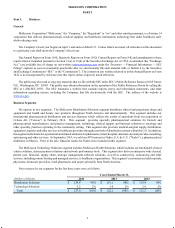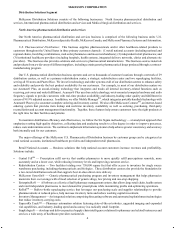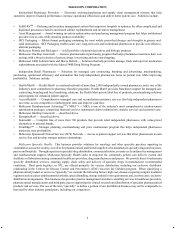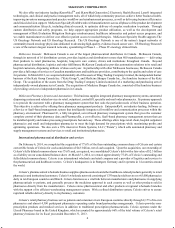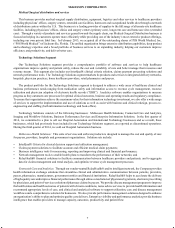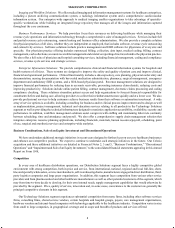McKesson 2014 Annual Report Download - page 16
Download and view the complete annual report
Please find page 16 of the 2014 McKesson annual report below. You can navigate through the pages in the report by either clicking on the pages listed below, or by using the keyword search tool below to find specific information within the annual report.
McKESSON CORPORATION
13
Operating, Security and Licensure Standards: We are subject to the operating and security standards of the Drug Enforcement
Administration (the “DEA”), the U.S. Food and Drug Administration (“FDA”), various state boards of pharmacy, state health
departments, the U.S. Department of Health and Human Services (“HHS”), the CMS and other comparable agencies. Certain of
our businesses may be required to register for permits and/or licenses with, and comply with operating and security standards of
the DEA, FDA, HHS, CMS, various state boards of pharmacy, state health departments and/or comparable state agencies as well
as foreign agencies and certain accrediting bodies, depending upon the type of operations and location of product development,
manufacture, distribution, and sale. In addition, and as part of these operating, security and licensure standards, we regularly
receive requests for information and occasionally subpoenas from government authorities. Although we believe that we are in
compliance in all material respects with applicable laws and regulations, there can be no assurance that a regulatory agency or
tribunal would not reach a different conclusion concerning the compliance of our operations with applicable laws and regulations.
In addition, there can be no assurance that we will be able to maintain or renew existing permits, licenses or any other regulatory
approvals or obtain without significant delay future permits, licenses or other approvals needed for the operation of our businesses.
Any noncompliance by us with applicable laws and regulations or the failure to maintain, renew or obtain necessary permits and
licenses could have a material adverse impact on our results of operations.
Pedigree Tracking: There have been increasing efforts by Congress and state and federal agencies, including state boards of
pharmacy and departments of health and the FDA, to regulate the pharmaceutical distribution system in order to prevent the
introduction of counterfeit, adulterated and/or mislabeled drugs into the pharmaceutical distribution system (“pedigree tracking”).
In November 2013, Congress passed and the President signed into law the Drug Quality and Security Act (“DQSA”). The DQSA
will establish federal standards requiring supply-chain stakeholders to participate in an electronic, interoperable, lot-level
prescription drug track and trace system. The law also preempts state drug pedigree requirements.
In addition, the Food and Drug Administration Amendments Act of 2007, which went into effect on October 1, 2007, requires
the FDA to establish standards and identify and validate effective technologies for the purpose of securing the pharmaceutical
supply chain against counterfeit drugs. These standards may include any track-and-trace or authentication technologies, such as
radio frequency identification devices and other similar technologies. On March 26, 2010, the FDA released the Serialized
Numerical Identifier (“SNI”) guidance for manufacturers who serialize pharmaceutical packaging. We expect to be able to
accommodate these SNI regulations in our distribution operations. The DQSA and other pedigree tracking laws and regulations
could increase the overall regulatory burden and costs associated with our pharmaceutical distribution business, and could have a
material adverse impact on our results of operations.
Privacy: State, federal and foreign laws regulate the confidentiality of sensitive personal information, how that information
may be used, and the circumstances under which such information may be released. These regulations govern the disclosure and
use of confidential personal and patient medical record information and require the users of such information to implement specified
privacy and security measures. Regulations currently in place, including regulations governing electronic health data transmissions,
continue to evolve and are often unclear and difficult to apply. Although we modified our policies, procedures and systems to
comply with the current requirements of applicable state, federal and foreign laws, including the Health Insurance Portability and
Accountability Act of 1996 (“HIPAA”) and the Health Information Technology for Economic and Clinical Health (“HITECH”)
Act portion of the American Recovery and Reinvestment Act of 2009, new laws and regulations in this area could restrict our or
our customers’ ability to obtain, use or disseminate personal or patient information, or could require us to incur significant additional
costs to re-design our products in a timely manner, either of which could have a material adverse impact on our results of operations.
In addition, the HITECH Act expanded HIPAA privacy and security requirements and increased financial penalties for violations.
It also extended certain provisions of the federal privacy and security standards to us in our capacity as a business associate of our
payer and provider customers. These standards may be interpreted by a regulatory authority in a manner that could require us to
make a material change to our operations. Furthermore, our failure to maintain confidentiality of sensitive personal information
in accordance with applicable regulatory requirements could expose us to breach of contract claims, fines and penalties, costs for
remediation and harm to our reputation.
Healthcare Reform: The Affordable Care Act significantly expanded health insurance coverage to uninsured Americans and
changed the way healthcare is financed by both governmental and private payers. While certain provisions of the Affordable Care
Act took effect immediately, others have delayed effective dates. We do not currently anticipate that the Affordable Care Act or
any resulting federal and state healthcare reforms will have a material impact on our business, financial condition and results of
operations. However, given the scope of the changes made and under consideration, as well as the uncertainties associated with
implementation of healthcare reforms, we cannot predict their full effect on the Company at this time.


